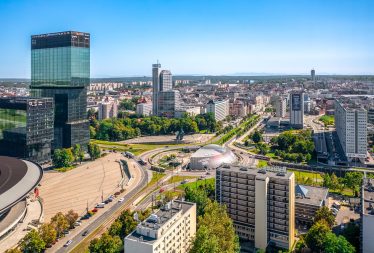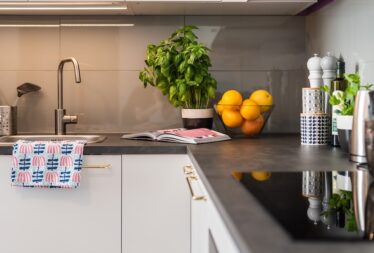From An Atlantic Island To Silesia. The Story Of A Portuguese Student In Katowice
We met on a very rainy day that looked more like November than the middle of a beautiful Polish May. The cold season has definitely been too long this year – not only for us but also for António, who has just spent his first winter in Poland. Fortunately, the cozy atmosphere of the Portuguese café where we met and the authentic taste of pastéis de nata (the world-famous Portuguese dessert) soothed our souls and allowed for a long conversation about Poland and Katowice, and the differences between Portuguese and Polish mentality.
ABOUT: António Loja is a 21-year-old Portuguese student from the island of Madeira. He’s been in Katowice since October 2022 studying for a master’s degree in International Business at the University of Economics.
António was born and raised in Funchal – the capital of Madeira. At the age of 17 he moved to mainland Portugal to study communications, PR, and marketing at the University of Coimbra (the oldest and the most prestigious university in Portugal). While getting his bachelor degree, he spent an Erasmus semester in Vilnius, Lithuania. And that’s the place where his Polish story began.
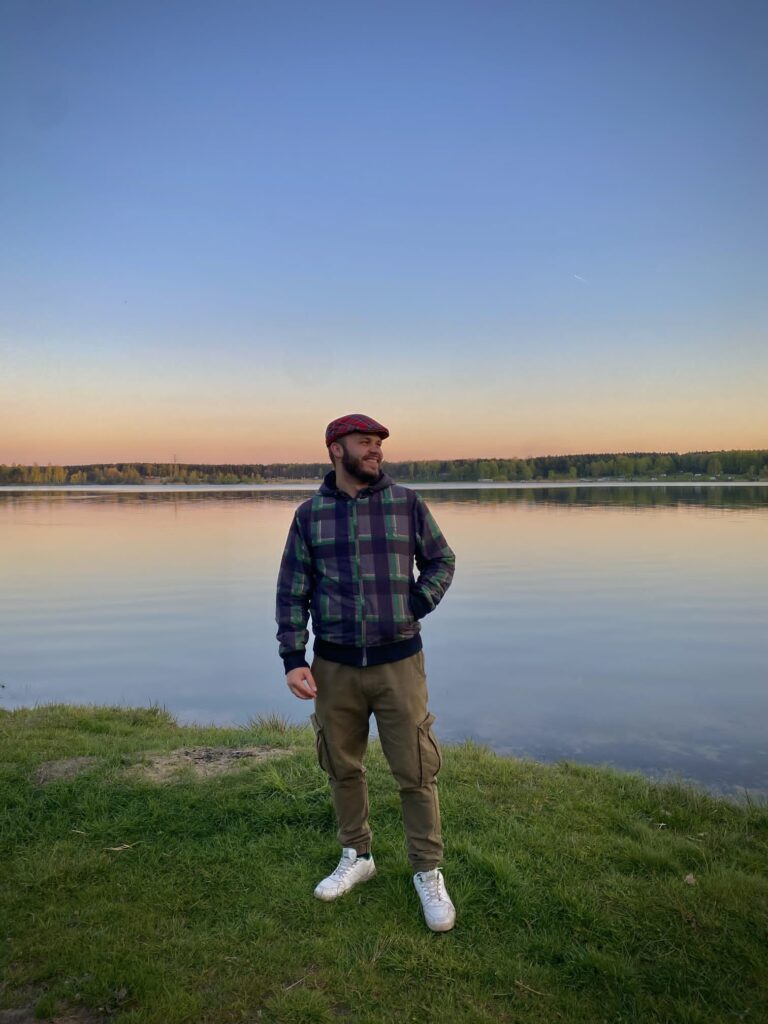
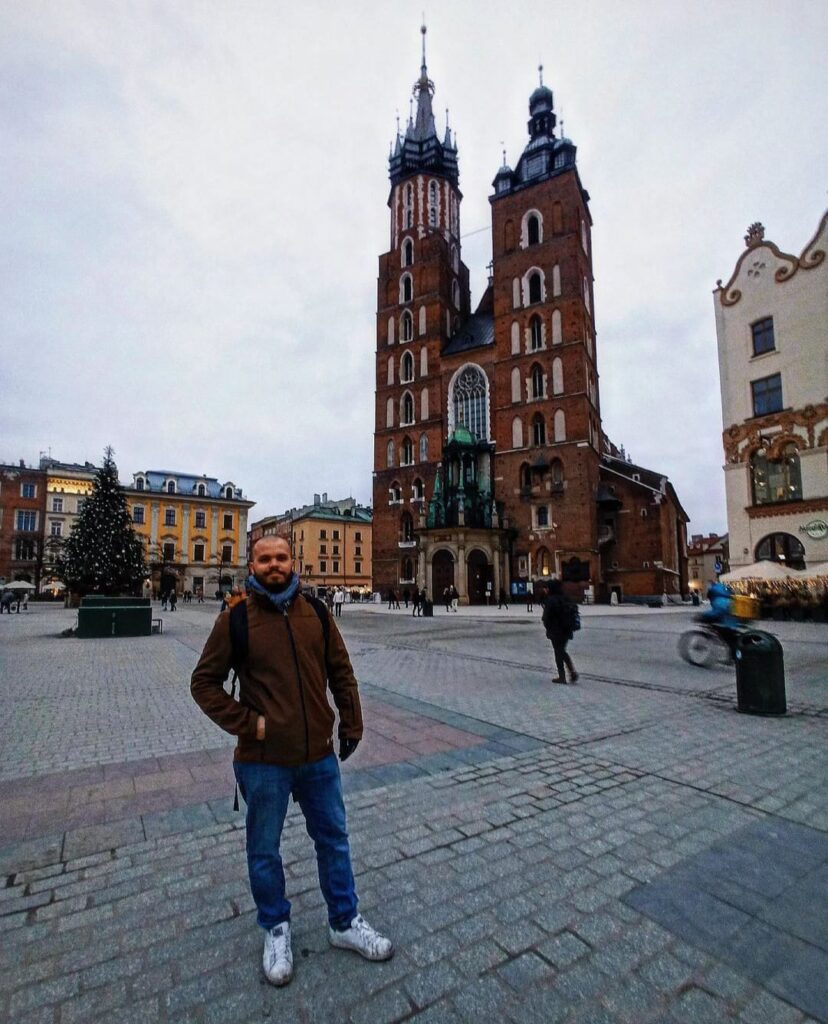
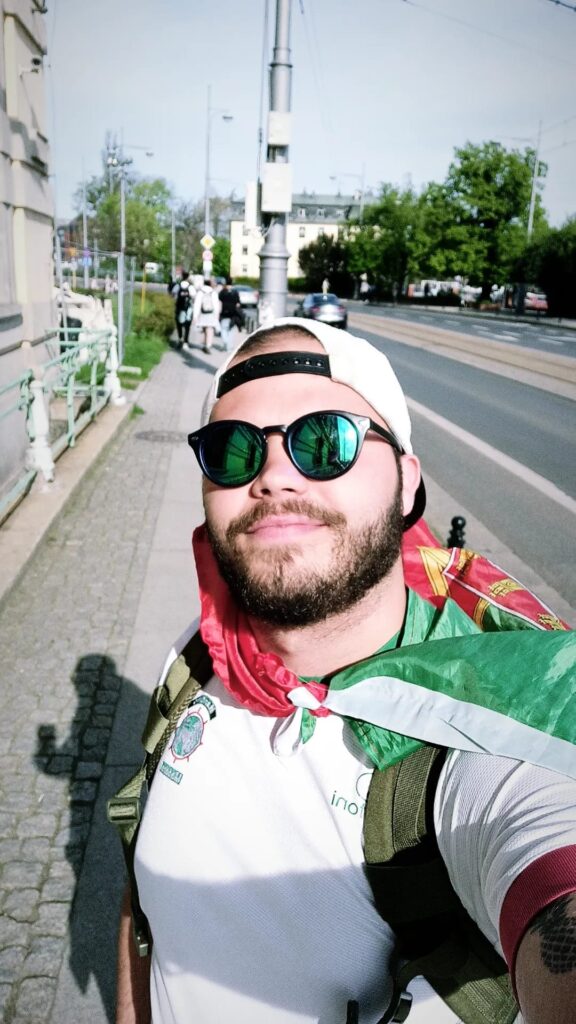
Wellcome Home: How did it happen that you’re here, in Katowice?
Antonio Loja: That’s a very good story, indeed. When I was in Lithuania, I met a Polish girl, and we started dating. I visited Katowice 2 or 3 times for short trips. When I finished my bachelor’s degree in Portugal I wanted to study abroad again because I missed that international spirit and I thought it was a perfect time to discover different things and do crazy stuff 😉 And then my Polish girlfriend suggested: “Why don’t you come to Katowice? We’ve got a good masters program here and the city is nice too”. So I thought, why not? And here I am!
WH: What were your first thoughts about the city when you moved here?
AL: I think I wouldn’t have chosen Katowice if not for my girlfriend (although we’re not together anymore). I was here before, but only for weekends, so my initial impression as a tourist was amazing. All these buildings, bars, and people everywhere. This area of Europe is very easy to travel around and stay for a while. Arriving for the long term was a bit difficult for me at the beginning. I found some barriers, mainly language, so my challenge was to develop my Polish as fast as possible.
Also, as a student, you start doing the same things every day, so after several weeks of classes, I started to be a little bit bored, especially in the winter. Now in summer, there are way more activities and things to do outside. Also, I started to really enjoy the city over time and I discovered its many secrets. I also know many people from other countries.
WH: And what positive surprises did you find here in Katowice and Poland in general?
AL: I was really surprised with the technology. I never expected a country in Central Europe to be so well-developed and user-friendly. Since I’ve been here, I’ve never used cash, even if I have to pay 10 cents. It couldn’t happen in Portugal, and even in Germany you need to have cash.
The other thing that surprised me was the nature. Also, the cost of living is pretty cheap. I travel a lot by train and by bus. I think the transportation system is much better than in the Southern countries.
WH: How about people?
AL: They can be very helpful if they feel you are also making an effort, and you like Poland. If they see you try to speak some Polish, they’ll make an effort back. I think Polish people know how hard living here can be, so if they see a smile on your face, they are willing to help. But they are not so friendly to tourists on vacation. It’s completely different from Southern countries that depend on tourism and where a tourist is a king.
So my advice is: just ask questions, be curious about the culture, put in some effort, and Polish people will be so grateful and friendly to you.
WH: Is it really easy to make friends with Polish people?
AL: Most of my friends here are Polish. But it was a bit difficult to make friends in the master’s program, as people have many responsibilities in their daily lives. I came here just to study, so I have a lot of free time, but my master colleagues don’t.
Something that surprised me a lot is the attitude of young people. They feel pressure to start working very early, even when they’re studying at the same time. In Portugal, we want to enjoy the time while studying because we know after that it will be hell 😉 I think students should enjoy themselves more, because this time you can’t get back.
WH: I guess it’s about a different mentality. We just want to be more independent as soon as possible, that’s why we put in more effort.
AL: Yes, but only during the work week. And then, on Saturday, you try to enjoy the end of the week in just one day. And you really do some crazy things I’ve never experienced before. Also, you’re able to work really hard the entire year just to spend 2 weeks of vacation away. It was surprising to see people my age with so much responsibility.
I know sometimes people are sad when they don’t have enough time to show me around. They’d like to be there, but they have too many daily duties. It’s a different mindset.
WH: And what are your main free time activities here? How do you spend your weekends?
AL: I used to rent a flat with Portuguese Erasmus students that also had more free time. In winter it was really hard to do anything. In Lithuania it was even worse, but still most of our time was spent inside, playing cards, watching movies. We don’t have snow in Portugal, so we also had some snowball fights and they were fun!
Now during the summer I try to go to parks more because I miss nature. The nature around Katowice is amazing, so I just explore it. Also, I spend a lot of time here in the city, at the outside cafés. We, Portuguese, love sitting outside, catching some sun, and watching urban life go on.
WH: Let’s talk about your studies. How would you compare studying in Portugal to Poland?
AL: The Portuguese educational system, as in other Southern countries, is very old school. Teachers don’t care if you learn or not, they just speak for 2 hours and if you don’t want to listen, you go home and study alone. Sometimes they don’t even know your name.
Here, in Poland, they care about the students. They see if you are following along and they ask questions. The groups are smaller, so it’s easier for you to do activities. And the classes are way more practical. We have projects and we write essays. Maybe it’s because I study in the International Business program, but that’s the experience I have, and that’s amazing.
WH: So happy to hear that! And what is your feeling about the University of Economics, Welcome Point, and their commitment to foreigners?
AL: Again, my experience is amazing. I have friends all over Europe and when I tell them about what we are doing at the university, they go crazy. It’s really special. Having a space just for foreigners and someone to pay attention to you and help you with everything is just unique. Handling many issues here in Poland may be out of our comfort zone, but the Welcome Point is a place we can really count on. It’s a safe spot.
Also, in terms of international people, the University just loves to host them. They also hire international teachers. I remember my interview for the master’s program, and they were so happy to have a Portuguese on board. And the feedback from my colleagues of other nationalities, Africans, Asians, is the same.
WH: As Wellcome Home we rent apartments, so I have to ask you about that part of your life here in Katowice. What’s your rental experience?
AL: When I was still in Portugal, I started to search for a place. I booked a nice one close to Silesia Park and paid the deposit, but I had many problems with that. I was supposed to arrive in October, and I paid for the room in advance also for September. But the owner said: you didn’t show up in September, so I rented it to someone else.
WH: How come?
AL: Yes… So I finally arrived without a place to be. I stayed in a hostel for one week, and then I met some Portuguese people also looking for a new place. They were living in a dormitory and they weren’t enjoying the place. We found an apartment on Staromiejska – 3 rooms for 4 people. It was in an old building, without internet, without desks or closets, but the location was just amazing. And we had a balcony. We decided to stay there, as we didn’t expect to spend so much time at home. But in the winter we did spend a lot of time inside.
Also, at that time, we couldn’t find any place with a half-year contract. We tried to search, but nobody wanted to offer us a shorter term. Finally, we negotiated for half a year, but after the first semester my Erasmus mates left and I couldn’t find any replacements. I decided to move somewhere out of the very city center. Now I live in Bogucice.
During the first semester, we were always on Mariacka, Staromiejska, the market square, and the Galeria Katowicka. For Erasmus students, location is really important. They want to be in the center, experience the environment. I’m happy to have both experiences: living in the city center and somewhere outside.
WH: I’d like to ask you about the main differences between Portuguese and Polish people and their mentality.
AL: Oh well, there are a lot! I’ve already experienced many differences in Lithuania. I never expected people from the same continent to be so different. I don’t even know where to start.
Portuguese people are really open, they love to socialize, they gossip, and they care a lot about everybody around. And they hate being at home alone. They spend most of their time outside, drinking lots of coffee. We’re lazy and need a break in the middle of the day. We also don’t care a lot about what other people think.
The Polish mindset is completely different. You’re afraid to go outside the box, you do things straight. You consider many things impolite, like raising a hand to call a waiter. Also, in many places (bars especially) you don’t have table service. In Portugal, table service is crucial.
And you’re overthinkers. You need to plan everything in advance. We take the day just as it comes. If you ask a Polish person what they plan to do in a year, they’ll get very stressed to give you an answer. And me, I even don’t know what I’ll do tomorrow! You’re taught to have a plan 5 or even 10 years in advance. You have too much pressure, that’s why on weekends you do that crazy stuff 😉
WH: And the positive sides of our mentality?
AL: I think your planning is nice, as long as you’re not too attached to it. If you have nothing to do, you’re bored. Also, you’re very responsible and organized. Portuguese are not at all.
WH: Is there anything you miss about Portugal while living abroad?
AL: The sea, definitely. I’m from an island, so I grew up seeing the sea every day. Also, I miss the connections between people on the street. In Portugal, you just go out, sit in the esplanada [Portuguese word for patio] and you never know who you’ll meet. You can meet ten new people or a friend you haven’t seen for a long time. In Poland, you never go out alone for a coffee or a beer, just wait for people to arrive.
But I also miss some things about Lithuania, and I’m sure I’ll miss things about Poland one day. You only know what you miss after you leave.
WH: I know that you, Portuguese, don’t plan so much, but… do you have any plans for the nearest future already?
AL: For now, I’d like to travel more across Poland. I have Polish friends telling me: “You’ve been here for several months, and you’ve already visited places I’ve never seen in my country”. I also want to go North and visit the coastline, but maybe not during the summer, but later when it’s less crowded.
In June, I’ll go to Romania and then to Portugal, so I don’t have an entire summer here. And later… I don’t know. In January, I’ll probably go to Iceland. I have an invitation, and it’s been my dream since I was a kid to visit Iceland.
WH: What would you tell to your Portuguese friends asking you if they should come to Poland?
AL: Definitely, I’d tell them to come! First, because the situation in Portugal is not very happy now. Also, just going somewhere outside your home and seeing how living in a different place gives you a different perspective. Moreover, Poland is a good place to come, especially when you’re young and you want to study. Katowice is a perfect-size city for Erasmus. Not too big, so you can see 100% clearly what it is. Prices are reasonable, the atmosphere is friendly, and it’s a great base to travel to Cracow, Warsaw, and other countries too.
Depending on the area where you live, Poland is also great to work in technology, gaming, everything related to IT. Companies are open to foreigners. The salary is similar to Portugal, but the cost of living is way lower. It’s one of the best places to be right now. I met 10 Portuguese people working and living here for six years now, and they don’t want to go back. Apparently, everyone can be happy here.
WH: Obrigada, António!
AL: Dziękuję.
Special thanks to the University of Economics in Katowice and their Welcome Point for helping to arrange this interview and for the commitment in promoting Katowice as a foreigner-friendly city.
